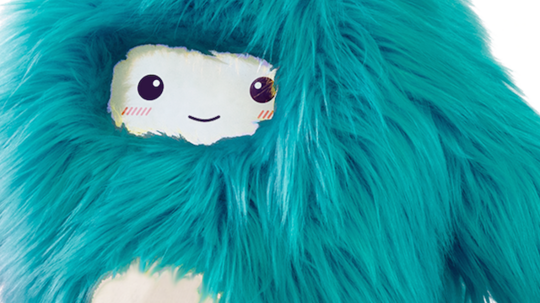
Educational toys: The very phrase could send some people into a boredom-induced coma. But the current generation of children may be in luck compared to those of us already fully grown. Woobo, a Cambridge-based startup, is using robotics and artificial intelligence to make the ultimate educational toy that doubles as a friend for kids. Co-founders Feng Tan, Di Wang and Shen Guo - along with their team - are developing a cute, cuddly robot that's meant to educate, engage and entertain your wee ones.
The inspiration behind Woobo came from Tan, an MIT alumnus, and his personal affinity for cuddly plush toys.
“I’m a huge fan of animation and Sci-Fi,” he said. “In my own house, I have a ton of plush toys.”
But Tan and his co-founders felt children’s one-sided interactions with stuffed animals are falling short.
It’s not a toy that grabs children’s attention for 30 minutes.
He explained, “What if we can make something that’s cute and loving...but can talk and play with them? Children respond so well to robots. They treat them like a small puppy, not a machine. We knew we could build a robot to serve an emotional need and educational need for them.”
The initial idea for this robotic “companion for children” dates back around the end of 2014, and in the beginning of 2015, members of the Woobo team started prototyping.
“At that time, we didn’t have designers, so we had a very ugly robot who could tell some jokes,” Tan laughed. But in April, 2015, they doubled down on building Woobo and are now closing in on a final model.
So what’s Woobo like? From a physical standpoint, the robot looks like an adorable anime creature. Its squishy, soft body is outfitted with hardware components, such as sensors, so the robot can move and appropriately respond to different physical touches. At the top, a screen displays its face, which Tan says is capable of displaying about 20 facial expressions - and not just those indicating positive emotions.
“It’s not always happy,” Tan told us. “It can be sad. It can be bored. So it can require the kids to take care of the robot. That’s where parents see the value of it: It teaches them to be responsible and to become self-disciplined, especially about having a daily routine.”
Woobo, Tan said, will be with children every step of the day, if need be. The cuddly robot can gently wake them up in the morning, guide them through grooming rituals, play with them, be there to answer questions, tell them stories, do role-playing activities and ask the children to take them to bed when the day is winding down.
“They can learn about being responsible, being caring,” Tan said. “It teaches social, developmental values through interactions… It’s not a toy that grabs children’s attention for 30 minutes. It really inspires curiosity and imagination.”
Woobo was designed with children age three to eight in mind. The team has developed various content for different ages, so parents can wirelessly download updates to the robot as their children grow.
And even though Woobo leverages artificial intelligence to work, the robot isn’t afraid to admit when it doesn’t know the answer to a question. When Woobo is stumped, it will ask children to go ask a parent and let it know the answer, too, when they find out.
According to Tan, some people have compared Woobo to other educational toys focused on teaching children STEM skills that have been recently coming into the market. However, he emphasized, unlike other tools for kids, Woobo is dedicated to helping them develop soft skills, like creativity and curiosity.
“Imagination is the key part to release children’s future potential,” he said.
Since completing the MIT Global Founders’ Skills Accelerator in 2015, they have received seed funding from Kunlun Group in China. The Woobo team has completed the development of the robot’s individual modules, like speech and movement, and they are currently seeing how these functions work all together.
They’re looking to gain more feedback from local parents and children interested in testing Woobo in the coming months and they plan to bring a product to market before the 2017 gift season, at which point the price will be determined (although Tan estimates it will cost between $150 and $250).








